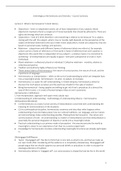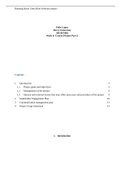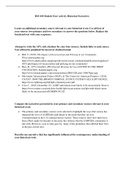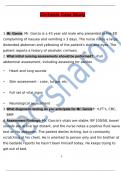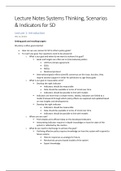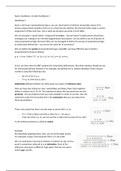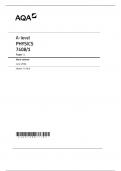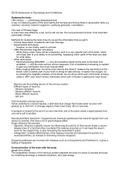Lecture 1: What is hermeneutics? A brief History
• Objectivism - there is independent world, set of facts independent of any subjects. Moral
objectivism maintains there's a single set of moral standards that should be adhered to. There are
rights and wrongs which are universal.
• Subjectivism - kind of (I think therefore I am) everything is relative to me because I’m a subject;
staring with the self; the subject, what is true or morally right depends on the perspective of the
subject (individual relativism) (only you) Under moral subjectivism, morals are subjective; they are
based on personal tastes, feelings, and opinions.
• Relativism - subjectivism with different frames of reference (what one refers to), for example
culture can be a frame of reference or if the world is frame of reference than one’s position is
objectivism (the world that is independent of any subject) ® relative means it is connected to
something – all interpretations are equally as good - everyone’s perspective on truth is truth
(individual)
• Moral relativism = collective/cultural or individual / Collective relativism - morality, relative to
collective perspective
• Tradition and authority highly influence our thinking.
• Three central claims of Hermeneutics: the nature of consciousness, the nature of truth, and the
importance of language.
• Hermeneutics or interpretation – refers to the sort of understanding by which we integrate facts
into a meaningful whole. hermeneuein = to utter, to explain, to translate
• Hermeneutics is a quest for self-understanding. In Greek antiquity, hermeneutics aimed to
discover the truth about ourselves and the world we inhabit for the sake of wisdom.
• Being Hermeneutical – being capable and willing to get rid of one’s prejudices (it is almost the
way of life for some…) It is task of human being to relay on one’s autonomy
Hermeneutics 2 definitions:
1.Text interpretation; approach with open mind; tabula rasa
2.Understanding of understanding - methodology of understanding (theory = hermeneutics
(philosophical discipline))
• (1) Hermeneutics as a basic human activity of interpretation concerned with understanding the
meaning of communications or life situations.
• (2) As a philosophical discipline, hermeneutics examines and describes what happens when
understanding of any kind takes place; how our cultural traditions, our language, and our nature
as historical beings make understanding possible. Philosophical hermeneutics - the nature and
communication of truth - all understanding is a matter of interpretation and that interpretation is
essentially the personal integration of objects or words into a meaningful whole.
• Practical understanding is our primary mode of perception - the way we perceive the world as
meaningful is closer to our experience of art than to a science experiment.
• Knowledge for hermeneutics involves understanding meaningful structures we already participate
in.
(Dis)engaged Self/Reason
• Taylor: ‘disengaged self’: We like to think that no one tells us what to do, and that we make up
our own minds after considering all the evidence in a completely unbiased way. Disengaged-self
people argue that we should suppress our personal beliefs or prejudices in order to escape the
ideological blinders of tradition.
• Hermeneutics believe in ’engaged self’: our consciousness is shaped by how we live in this world.
1
,• ‘Engaged self’ is fundamentally connected to the world and to other people; culture, language,
upbringing, tradition, and community shapes our understanding. Past texts or events hold
meaning for us in the first place because we stand within a tradition that has provided us with the
very concepts through which we are connected to the past in a meaningful way.
• We are part of history, as we are historical beings.
• Disengaged reason: detached observer
• Based on the assumption of separation between mind and world, the disengaged self naturally
favours disengaged reason. (Descartes) Disengaged reason is the kind of abstract, theoretical view
of truth we know from a scientific laboratory; we have falsely elevated this scientific ideal of
knowledge, allowing it to become the measure of all human knowledge.
• = looking at truth from above and from 'within' (e.g., within history)
• Not: watching a football game but playing it (spiel)
Language
• Instrumental view but it is more than instrument of expression – we think in language.
• Tool to transmit culture.
• Language guides our perception intrinsically.
• ideal: ‘naked truth‘ ’facts only’ – division between our perception of the world (as so many
objects external to us) and the images or linguistic expressions we use to designate these objects.
• <-> pre-understanding crucial – symbolic universe into which we are inducted from childhood on
provides pre-understanding of the things we interpret.
• Example: temperature – hermeneutics deny that we can have a meaningful experience without
understanding pain or temperature first within a cultural vocabulary by which we make sense of
things.
• World/culture is given through language.
• For disengaged-self people and their theoretical, detached way of seeing the world, language is
like a toolbox of labels we attach to things in order to handle them. (like psychology)
• Common objection to the universal claim of hermeneutics that all understanding is a matter of
interpretation is that our immediate sense experience of the world precedes any interpretation.
• Hermeneutic thinkers claim that naked truth does not exist. -> the world is given to us already
interpreted through language. Language, as Martin Heidegger famously put it, is ‘the house of
being’.
Objectivism or Relativism?
• Relative to our history/culture
• Interpretation <-> knowledge?
• Scientific objectivism (experiment is rule governed)
• Zimmermann says that hermeneutics goes beyond objectivism vs subjectivism – it is not even
relativism.
• Relativism is the concept that whatever we hold to be true has no absolute, universal validity but
is relative to our personal historical and cultural circumstances.
• Moral relativism means that all moral claims are simply cultural conventions that can be changed
at any time.
• Relativist: someone who claims that knowledge is always a matter of interpretation. Objective
truth is impossible and that all we have are competing, mutually exclusive truth claims.
• For hermeneutic thinkers, this is how all knowledge works. Objective understanding of the world,
others, and ourselves requires personal engagement and passionate curiosity.
• The hermeneutic claim that our knowledge is always relative to a certain context and personal
viewpoint would only be relativism if we actually were isolated selves, unformed by history or
2
, language. In truth, our standpoint always includes a universally valid context of meaning – a
‘horizon’ (tradition and language).
• Most hermeneutic thinkers are firm believers in universal reason that allows for translation
between all languages and cultures.
• To perceive is to interpret – to understand is to interpret: this universal claim of hermeneutics is
not relativism but the admission that we are not gods.
History of Hermeneutics
In ancient (Greek and Roman) times:
• all understanding was considered to be helpful for self-understanding
• Truth, morality, and beauty were one - all knowledge is One.
• Religion, poetry etc. were pan of this comprehensive structure.
• All understanding leads to self-understanding, to character formation (virtuous life)
• common reason – logos.
• Jewish theologians equated the cosmic ‘Logos’ with the creative power of God, and thus opened
up the way for Christianity’s interpretation of Christ as the eternal power and wisdom of God,
who, Christians believed, had become a human being.
From 14th century onwards:
• Human mind and world become disconnected.
• In order to obtain certain knowledge, Descartes doubted everything the ancient world had
considered reliable sources of knowledge: truths handed down by tradition, religious or worldly
authorities, the body, emotions, and the senses.
• Descartes – true knowledge belongs to those ‘who have the ability and the desire to withdraw
from the senses and at the same time from all prejudices’.
• Descartes: Traditional authority has no basis anymore
• Ideal: Objective, unbiased knowledge in Western (?) thinking – (only possible because of God)
(that is not possible)
(Enlightenment)
• Kant: Autonomy/reason <-> tradition
• Intellectual maturity meant the independence of reason from tradition.
• Epistemology becomes central, precedes ontology, theories about correct knowledge.
Current situation:
• Inherited: objective knowledge = value free facts
• Other minds are not part of an overarching whole any longer
Lecture 2: Hermeneutics: A brief History (Ch. 2: Schleiermacher, Dilthey, Husserl, Heidegger).
Schleiermacher
• Attempt to find bridge between mind and world; (1) redefinition of objective knowledge as
unbiased, value-free fact; (2) the problem of how to access other minds. Task of modern
hermeneutics.
• Bridge between religion and science (general knowledge).
• Bridge between educated despisers of religion and the rest.
• -> universal conditions for understanding?
• Romantic period: ’religion is feeling for the universe’
• Romantic hermeneutics, seek an author’s meaning behind a text, looking to commune with
another soul, or fusing two minds through words.
• Romantic ideal: Ideal of understanding as communion with another’s soul.
3
, Hermeneutic circle: some greater context always influences how we understand a particular part;
whole and part influence each other.
• Reflective equilibrium between part and whole
• Human reasoning, no matter in what area of life, always operates according to this circular
movement between part and whole.
• ‘Ontology of understanding’: nature of reality and what kind of beings we are.
• ‘Feeling of absolute dependence’, ‘god-consciousness’ – deep sense that all our knowing depends
on some unspecifiable great unifying ground of reality -(cosmic spirit)- Connection to other minds.
• Holistic view of reality: we can attain knowledge of the universe or of God only through the
particular thoughts of others, through concepts, through comparative religions and worldviews;
any such expressions of the human spirit could in turn be grasped only through the particulars of
language and a person’s entire life contex.
Goal of interpretation:
• Move through the words of the other to his/her thoughts
• -> Reconstruct author’s state of mind in his/her context
• Author’s intention at state of writing
• It required grammatical skills, familiarity with historical context
• Empathy: leap into author’s mind
Judging Schleiermacher
• Understanding the Other: (is)Different goal than debunking the Other.
• Different goal of communication than what we think it is in e.g., politics (and science)
• Not debate, but dialogue!
• Criticism: stepping into other’s mind = stepping out of one’s own mind? (”out of body?”)
• Taking into account other’s context = neglecting our own context?
• Linguistic rules or interpretive methods alone are not enough to understand another’s message.
• He focuses too much on ontology rather than epistemology
• Husserl’s phenomenology: objects immediate connection to the observer
• Husserl believed that we really are in touch with the essence or true meaning of apple.
• The mind as part of reality is not a self-enclosed sphere but essentially correlated with objects in
the world.
Heidegger
• Hermeneutics: not a theory of interpretive principles but a way to move around in the world
• Understanding not a conscious effort but a way of life
• Conversation about knowledge moves - from epistemology to ontology - from theories about
knowledge - to the life context that provides the conditions for knowledge.
• Understanding: within this matrix of meaningful relations, we are constantly interpreting and
being interpreted. Making visible the meaning structures: ‘existentials’ (Existentialien)
• We don’t do hermeneutics, but we are interpreting animals
• Normally immersed in ’flow of being’
• Only when s.th. Unexpected happens (hammer had flies off) do we reflect about it treating it as an
abstract object
• Engaging with rather than thinking about world (e.g., Texts)
• Pre-understanding (not tabula rasa)
• We are language (not: we use it) ‘Language is house of being’ it ‘speaks us.’
• We are history and language and emphasis upon pre-understanding ® Gadamer
• ‘world’ is like familiar home.
4


